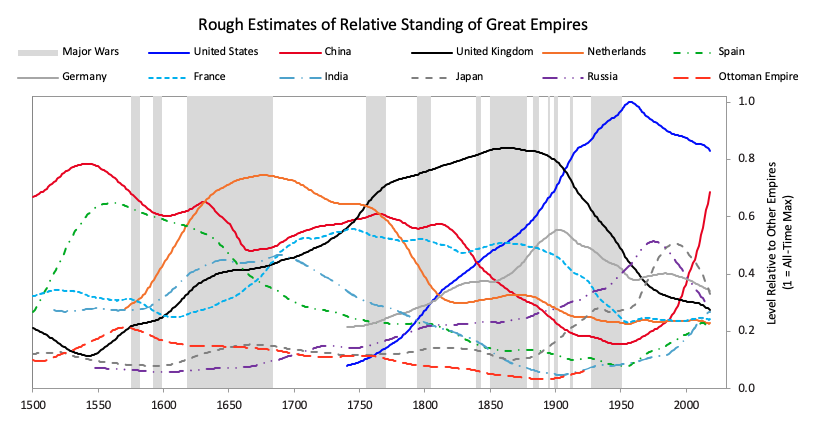Hello Friends,
And happy Friday!
This week, I want to share one of the toughest questions that occupy my mind, explain my personal research about it, and hopefully get your valuable insights.
How will the geopolitical world evolve in the next 3 decades?
Imagine a world with closed borders, states crumbling under national debt, shortage of basic necessities, Orwellian surveillance and strict restriction of movements.
Wait.
Let me reformulate.
Imagine all the above, but not because of covid.
Imagine a world at war. Cold or hot.
A world where countries openly fight for resources.
…
Most of us most likely struggle to imagine this, but we need to remember that the past 70 years of Pax Americana are an exception in the history of mankind.
And that people rarely saw such events coming in advance. (think Chamberlain)
What I am struggling to reconcile the following. People whose intelligence, experience, and knowledge I deeply respect have conflict views. And beyond the incomparable impact this question can (will) have on our lives, the theoretical challenge is annoying me big time.
China - the next global superpower?
On one hand, Ray Dalio, explaining that dawn is nigh for the US and that China will soon rule the world in its stead.
Excellent points, brilliant research and crisp analysis.
Growing inequalities, crushing national debt, and an education system falling apart are three of the key points in his case against the US.
As an American of his level of geopolitical understanding, plus his long experience personally working with China, his intellectual legitimacy is hard to challenge.
He thoroughly develops the argument in his book: The Changing World Order (summary to come - still I need to find time to format it).
He had some tragic personal life events, so it is not fully finished nor published, but most of it is available online, and I can’t recommend it enough to anyone wanting to understand the world and our history as a global society.
Or… the World falling into Chaos
On the other hand, this essay (book summary) I read recently: The Accidental Superpower.
The basis of its thesis is very close to a previous Macromegas newsletter I published: Macromegas #19 - United States: The Inevitable Empire.
But the author develops the thesis further:
The US is becoming energy-sufficient.
Its demography is the only promising one in the developed and developing world.
It is spending way too much on military to police the world.
The ROI granted by its world dominance is no longer worth it.
It will soon remove itself from the global scene.
China is incapable to take over - the EU is inexistent politically and militarily.
The rest of the world will crumble, fighting for oil and other resources.
Again, good points.
I spoke about China not being even close to the US military capabilities in terms of long-range “blue-water” navy capabilities in a previous newsletter: Macromegas #22 - China: Dreaming of a Blue-Water Navy (Part 2).
I also shared why (Macromegas #21 - China: The Planned Superpower (Part 1)) and how (Macromegas #23 - China: Territorial and Moral High Ground (Part 3)) China intended to reach that level by 2050.
China’s demography is also a time-bomb, not much to argue about there.
BUT
The points I don’t buy are A) that the US can be fully self-sufficient without global stability and B) that the ROI on their military spending is not worth it.
Energy is key, no doubt.
But there are other invaluable resources out there.
What about computer chips, for starters? There are EVERYWHERE. Again, I wrote about this recently: Macromegas #30 - Chips, China & the new Cold War. The US is far from self-sufficient, not even talking about the EU. Most of the world production capacity in China’s close sphere of influence.
What about commodities and raw materials? How do you build batteries, high-tech military requirements, or even steel? We forget about those, but without various high-specificity steels, we can say goodbye to most of last century’s innovations. This article paints the situation pretty well: Predicted scarcity of metals and rare elements are causing geopolitical tensions.
Lastly, what about skilled talents? I personally can’t believe the US economy and innovation could sustain itself at its current level without the existing influx of skilled students and professionals.
Plus China is also bound to lead the AI revolution, as Kai-Fu Lee shows and explains it in its well-informed book AI Superpowers: China, Silicon Valley, and the New World Order.
What to make of this?
Long story short, most arguments are very well-informed and quite valid on both sides.
So… I don’t know.
Apart from climate change, I don’t think there is any question right now that will have remotely as much impact on our lives in the next generation. So I will keep digging and thinking, and sharing my progress with you.
But I would be really really keen to get your input. Please comment or hit reply: I read all your emails.
Please don’t forget to share if you think this type of readings can interest others:
Thanks for reading, and have a peaceful weekend,
V



